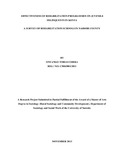| dc.description.abstract | The purpose of this study was to examine the effectiveness of rehabilitation programmes on juvenile delinquents in Kenya. The study was carried out in government rehabilitation schools in Nairobi County which included Kabete, Getathuru and Dagoretti. Specifically the study sought to establish the existing rehabilitative programmes in the institutions, environmental settings of the institutions, competence level of the officers working in the institutions, management policies and guidelines for these institutions. Overally, the study intended to find out how these factors affected the rehabilitation of juvenile delinquents committed to these institutions by looking at both short and long term benefits of the rehabilitation programmes to the juveniles delinquents.
The study was a survey of the juvenile rehabilitation schools in Nairobi County. The target population were the 3rd year juvenile delinquents, welfare officers, class teachers and vocational training instructors from the three institutions who were 179 in total and purposively selected.
Out of this, the study selected a sample size of 89 respondents. The data for the study was collected using questionnaires, interview schedules, focus group discussion and observation. After data collection, it was analyzed descriptively using excel, word and SPSS and then presented in tables, figures and prose form.
The study found out that the rehabilitation programmes for the juvenile delinquents in Kenyan rehabilitation schools were counseling, Education, spiritual welfare, vocational training and life skills training courses which included - masonry, mechanic, tailoring &dressmaking, carpentry & joinery and barber for the boys, hair dressing, tailoring & dressmaking, fashion & design and bakery for the girls. Training in agriculture and personal hygiene were common for all the children in the institutions.
These programmes were carried out in deplorable conditions which have greatly affected the juvenile’s rehabilitation process. Therefore most of the juveniles have not benefited from the rehabilitation programmes. The personnel that have been deployed within the rehabilitation schools are well trained and competent enough to effectively take the children through the process. At the same time the programmes that were provided within the institutions were carried out according to the management principles and guidelines.
The study recommended that vocational training courses should not be gendered as the current society does not distinguish between the male and female skills but should address areas where the juveniles are strong and areas of interest. Training in other courses should also be made more interesting especially education which improves on the country’s literacy levels. The stakeholders should put the necessary efforts to make living conditions more favourable for the children and learning facilities should be provided to facilitate effective delivery of the rehabilitation programmes. The government should increase the staffing/personnel of the juvenile rehabilitation schools and ensure that they are adequately trained to aid the juveniles through rehabilitation process. Boys need to be assessed on the challenges that are impeding on their rehabilitation process. The boys’ schools should evaluate the conditions provided in the institutions which seemed to be the greatest challenge while that of the girls should be given more favourable conditions to enhance their rehabilitation process. | en |

